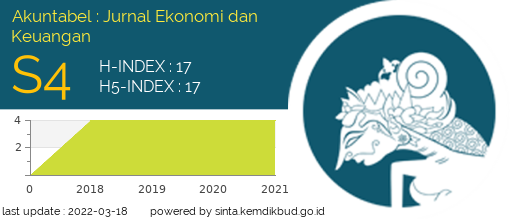Pengaruh budaya organisasi terhadap kinerja karyawan di era millennial
Abstract
Penelitian ini bertujuan untuk mengetahui pengaruh budaya organisasi terhadap kinerja karyawan, baik secara langsung maupun tidak langsung, melalui sikap kerja yang terdiri dari kepuasan kerja, komitmen organisasi, dan niat pindah kerja, di mana komitmen organisasi terdiri dari komitmen afektif dan komitmen berlanjut. Sampel dengan mengunakan convenience sampling, sebanyak 106 sampel, yang berasal dari karyawan yang bekerja pada perusahaan swasta di Jakarta, dan pengolahannya menggunakan Structural Equation modelling (SEM). Adapun hasil adalah budaya organisasi mempunyai pengaruh yang positif dan signifikan terhadap kepuasan kerja, komitmen efektif, komitmen berlanjut, kinerja karyawan, tetapi tidak berpengaruh terhadap niat pindah kerja. Kepuasan kerja berpengaruh negatif dan signifikan terhadap niat pindah kerja, namun tidak berpengaruh terhadap komitmen afektif dan kinerja karyawan. Komitmen afektif berpengaruh negatif dan signifikan terhadap niat pindah kerja, tetapi komitmen berlanjut berpengaruh positif dan signifikan terhadap niat pindah kerja. Komitmen afektif dan berlanjut tidak berpengaruh terhadap kinerja karyawan. Niat pindah kerja tidak berpengaruh terhadap kinerja karyawan.
Keywords
Full Text:
PDF (Bahasa Indonesia)References
Allen, N. and Meyer, J. P. (1990). The measurement and antecedents of affective, continuance and normative commitment to the organization. Journal of occupational Psychology, 63, (1), 1-18.
Boles, James, et. Al., (2007). The relationship of facets of sales person job satisfaction with affective organizational commitment. Journal of Business & Industrial Marketing. Vol. 22(5). 311-321.
Benkhoff , B. (1997). Disengaging organizational commitment: the changes of the OCQ for research and policy. Personnel Review, Vol. 26(1).114-120.
Brett, Joan F., William L. Cron, and John W. Slocum, JR. (1995) Economic dependency on work: A moderator of the relationship between organizational commitment and performance. Academy of Management Journal. Vol. 38(1). 261-271.
Brayfield, Arthur H., and Harold F. Rothe. (1951). An index of job satisfaction. Journal of Applied Psychology. Vol. 35(5). 307-311.
Carmeli, Abraham/ (2005). The relationship between organizational culture and with draw intentions and behavior. International Journal of Manpower. Vol. 26(2). 177-195.
Cramer, D. (1996). Job satisfaction and organizational continuance commitment: a two-wave panel study. Journal of Organizational Behavior. Vol. 17(4). 389-400.
Cotton, J. dan Tuttle, J. (1986). Employee Turnover: A Meta Analysis and review with implications for research. Academy of Management Review. Vol. 11(1). 55-70.
Harber, Jeffery G. (2011). Generations in the Workplace: Similarities and Differences. Electronic Theses and Dissertations. East Tennessee State University. Paper 1255.
Ismail, Maimunah. and Hoo Shien Lu. (2014). Cultural Values and Career Goals of the Millennial Generation: An Integrated Conceptual Framework. The Journal of International Management Studies Vol. 9(1).
Ito, Jack K dan Celeste M. Brotheridge, (2005). Does supporting employees’ career adaptability lead to commitment, turnover, or both?. Human Resource Management. Vol. 44(1). 5-19.
Iqbaria, M. and Greenhaus, J. H., (1992). Determinants of MIS employees’ turnover intentions: a structural equation model, communication of the ACM, Vol 35(2). 35-49.
Iaffaldano, M. T. dan Muchinsky, P. M. (1985). Job satisfaction and job performance: a meta analysis, Psychological Bulletin, Vol, 97(2). 251-273.
Jean, Siew Kim dan Kelvin Yu, (2004). Corporate Culture. Journal of Managerial Psychology. Vol. 19(4). 340-359.
Kampf, Rudolf., Silvia Lorincova, Milos Hitka, and Ondrej Stopka. (2017). Generational Differences in the Perception of Corporate Culture in European Transport Enterprises. Sustainability Vol. 9(1561).
Kim, Woo Gon et al., (2004). Effect of service orientation on job satisfaction, organizational commitment, and intention of leaving in a casual dining chain restaurant. Hospitality Management. Vol. 24(2). 171-193.
Lineker, Arru Gideon., Tetra Hidayati, Siti Maria. (2016). Pengaruh Iklim Organisasi dan Kepuasan Kerja Serta Komitmen Organisasional Terhadap Kinerja Karyawan. INOVASI. Vol. 12(2). 250-269.
Lock, P. dan Crawford, J. (2004). The effect of organizational culture and leadership style on job satisfaction and organizational commitment: A cross-national comparison. Journal of Management Development, Vol. 23(4). 321-338.
Lund, Daulatram B. (2003). Organizational culture and job satisfaction. Journal of Business & Industrial Marketing, Vol.18(3). 219-236.
Low, G. S., Cravens, D. W., Grant K., Moncief, W. C. (2001). Antecedents and consequences of salesperso burnout. European Journal of Marketing. 35 (5/6). 587- 614.
Meyer, J.P. and Allen, N.J. (1991), Three-component conceptualization of organizational commitment. Human Resource Management Review. Vol. 1(1). 61-89.
Panggabean, Mutiara Sibarani. (2006). Hubungan Keterlibatan Kerja dengan Kepuasan Kerja, komitmen afektif dan komitmen berlanjut. Jurnal Manajemen Sumber Daya Manusia dan Organisasi. Vol. 1(1).
Rashid, Md. Zabid Abdul dan Murali Sumbavisan dan Juliana Johari, (2003). The influence of corporate culture and organizational commitment on performance. Journal of Management Development. Vol.22(8)..708-728.
Robbins, Stephen P. dan Timothy A. Judge (2009). Organizational Behavior (13th ed). New Jersey: Pearson Education, Inc., Upper Saddle River/ Prentice –Hall
Russ, F.A., and McNeilly, K.M. (1995). Links among satisfaction, commitment, and turnover intentions: The moderating effect of experience, gender and performance. Journal of Business Research. 34(1). 57-65.
Syaifullah, As’ad., Iwan Adhi Prasetyo. (2018). Pengaruh Kompensasi dan Motivasi Terhadap Kinerja Karyawan. INOVASI. Vol. 14(1). 1-7.
Samad, Sarminah, (2006). Procedural and Distributive Justice: Differential Effects on Employees’ Work Outcomes. The Business Review, Cambridge. Vol. 5(2). 212-218.
Tribudhi, Debbie Aryani., Soeharjoto. (2019). Determinasi Transaksi Dengan Menggunakan Uang Elektronik di Indonesia. KINERJA. Vol. 16(1). 78-84.
DOI: https://doi.org/10.30872/jakt.v17i1.7330
Refbacks
- There are currently no refbacks.
Copyright (c) 2020 Mutiara Sibarani Panggabean, Soeharjoto Soekapdjo, Debbie Aryani Tribudhi
Editorial Address
Akuntabel: Jurnal Akuntansi dan Keuangan
Faculty of Economics and Business, Mulawarman University
Jl. Tanah Grogot No.1 Samarinda Kalimantan Timur 75119
Email: jakt.feb.unmul@gmail.com
StatCounter: Akuntabel: Jurnal Akuntansi dan Keuangan






